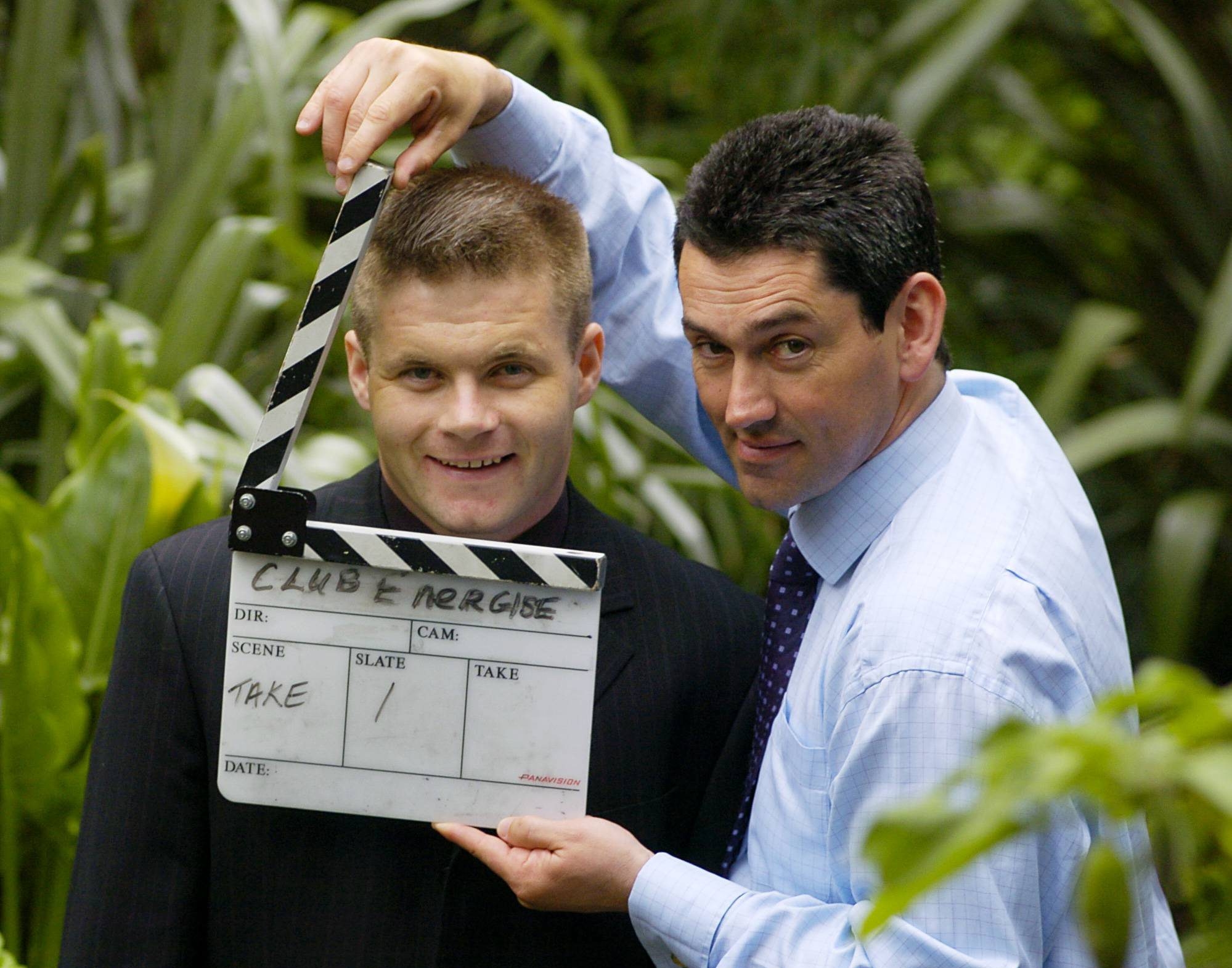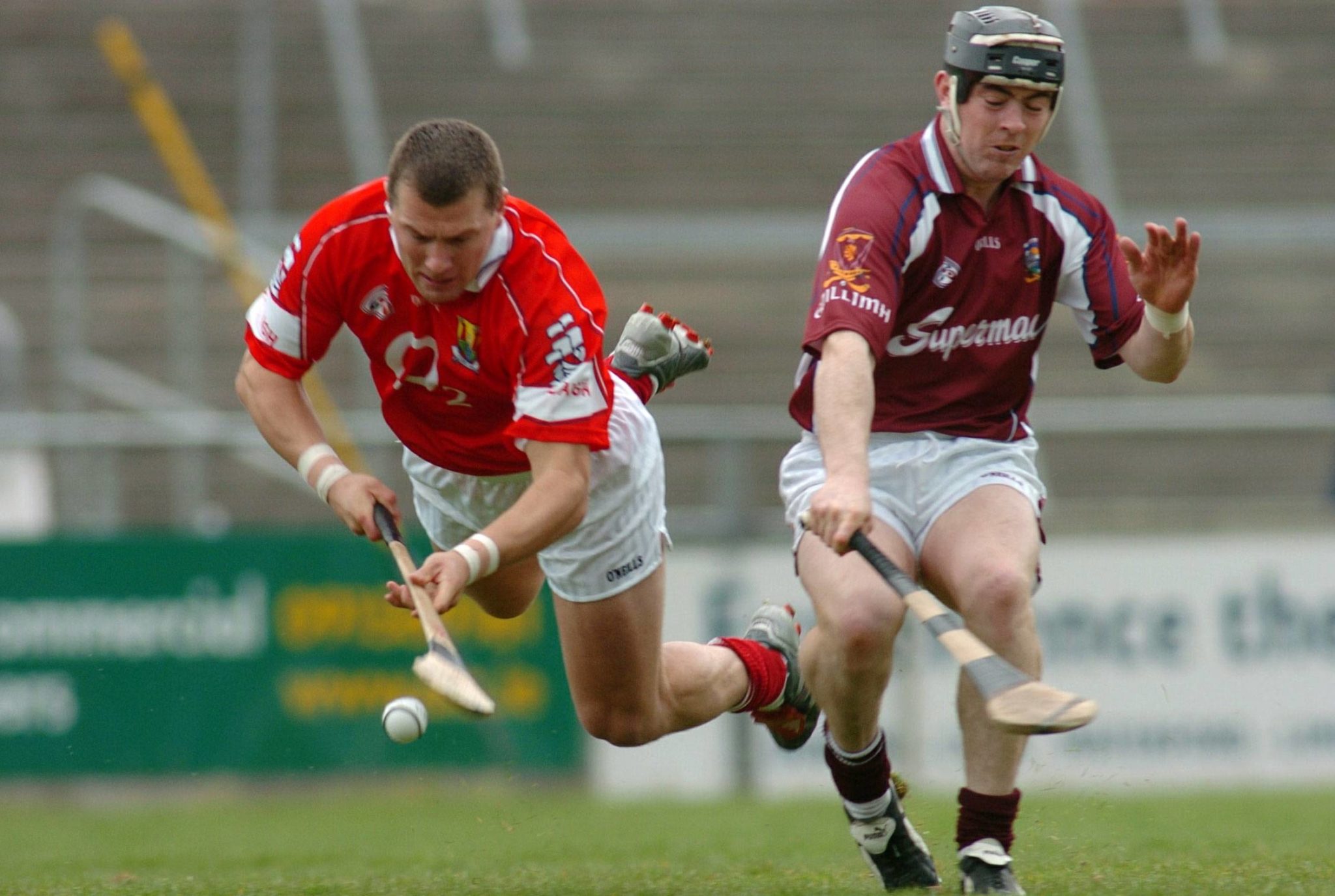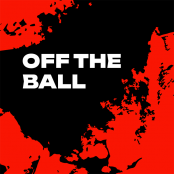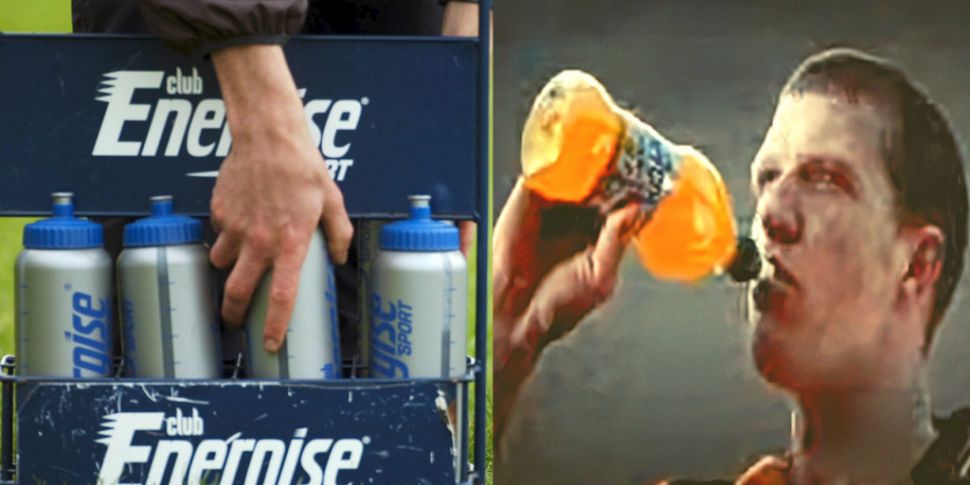Sixteen years after an advertising agency harnessed the commercial potential of GAA stars to successfully sell us Club Energise, Off The Ball's Arthur James O'Dea spoke with players who have walked on water, and those who showed them how to.
It was the sight of Eamonn O'Hara launching that ball in to commence this unlikely match that hooked me. In a knock-off replica of that unsurpassed black Sligo jersey, to the 13-year-old me it appeared that he manoeuvred on water with the same ease as if it were grass.
That the creative powers behind this television advertisement had achieved what they had set out to do in stimulating my local interest in their nationwide product didn't bother me. It was simply satisfying to know that the rest of Ireland must now be seeing O'Hara exactly as we did in Sligo - a legend.
"We were used to going down to some tiny hotel on the outskirts of wherever," recalled Colin Hart, the creative director behind the 2004 advertisement, 'Lake', "and these fucking legends would walk out. There’d just be scars all over them, their fingers would be banjoed and we would be doing a shoot with their kids there waiting on them.
"These sports are fucking amazing and it was just such a no-brainer to show these guys as the heroes they were on this ad.”
Between a hugely ambitious director, an experienced creative team with no interest in sport, the rabid determination of the GPA, and some bemused - but willing - GAA players ushered out onto a lake in the Wicklow mountains, Gaelic footballers and hurlers were brought into the big time.
An advertisement simply known as 'Lake', here's the story of how it all came about in their own words.
*****
“Basically, you want this ad to look more like Nike and less like liver fluke” – Michael McArdle
“It was a fucking dream come true for the GPA. We had taken on all-comers, had been hit with the hammer-blow so many times, but we were still there.” – Donal O’Neill
“I remember hitting him down the back of the head. That was a long time coming.” – Diarmuid O’Sullivan
I. "We went in to blow the doors off the thing"
Diarmuid O’Sullivan (Cork hurler): “It was probably the first time that any part of the GAA had decided to engage in this type of advertising campaign. It was a big statement that the GPA was going to be moving forward one way or another, with or without the GAA.”
Steven McDonnell (Armagh footballer): “When you’re tying yourself into a deal like this, it gets people talking.”
Eamonn O’Hara (Sligo footballer): “There was a lot of misinformation going around and certain traditionalists within the GAA, and a few of the traditional GAA journalists, they were quite opposed to the whole thing. ‘Who do these fellas think they are? We’ve managed to play Gaelic football for 100 years, why can’t we continue as usual?’ But there was just change in the air.
Chris Cawley (Advertising agency, CEO): “At that time, we were living in a country where the conservative, authoritarian culture emanating from all the institutions – of which the GAA had a huge relationship with – was coming under challenge from the start of the millennial generation, for use of a better term. Looking back now, that was evident in what the GPA were saying. ‘Look, we’re adults and we’re able to make our own decisions.’ In my mind, Dessie Farrell was absolutely passionate about that and the television advertisement sought to capture that.”
Colin Hart (Advertising agency, Art Director): “I wasn’t long back from Japan where they made superstars out of their local sportspeople. Everything had been so twee with GAA advertising. ‘Hello, I’m John whoever and I’m doing some shite on a radio ad where I have to explain who I am.’ The irony of my being raised a Protestant in Belfast, I had no preconceptions about the GAA, and Gaelic sports weren’t really something that I was into. I did know about marketing sport though, and to me this was a no-brainer. We needed to turn these lads into heroes and make them look like legends.”
Michael McArdle (C&C, Marketing Director): “I remember that I was sitting in my car at a petrol station in Carlow and I was talking to Colin from the agency. We were talking about how we wanted this ad to be different and, in the end, he just said: “Basically, you want this ad to look much more like Nike and a lot less like liver fluke.” I thought that summed it up pretty well. We didn’t want another GAA player in the Farmers Journal with a box of medicine at the end of a hurley.”
Eugene Cloonan (Galway hurler): “It certainly felt like a big deal. We’d seen the likes of Joe Cooney or Bobby Ryan dosing cattle in the ‘80s, but this was the start of something new.”
 11 May 2004; Dessie Farrell, left, and Michael McArdle, Marketing Director, C&C Ireland. Picture credit; SPORTSFILE.
11 May 2004; Dessie Farrell, left, and Michael McArdle, Marketing Director, C&C Ireland. Picture credit; SPORTSFILE.Donal O’Neill (GPA, Commercial Director): “Nobody had ever really mobilised the might of the GAA to good commercial effect before. In the GPA at that time, we fully intended to blow the doors off the thing. We knew that the GAA responds to only one thing and that is money. So, if we could put ourselves in a place where we could generate substantial income, and let’s be honest, we set out to disrupt things, the marketing department in Croke Park was weak by my analysis. They’d left the door open for us.
Michael: “All of the time in marketing, we’re looking primarily at two words: disruption and relevance. From a marketing point of view, you’re always looking to be relevant, but you also want to be as disruptive as you possibly can. I’d been looking for an angle to get into the sports drink market for a bit, but I couldn’t find one.”
Donal: “I’d love to say that it was my idea to do a sports drink, but it wasn’t. Peter Queally, a businessman down Wexford way, just mentioned it in passing and Dessie Farrell said that we should take it to C&C.”
Michael: “They’d got a meeting with Maurice Pratt (C&C, CEO) and he gave me a ring to ask whether I’d like to meet them. The minute I heard it a light went off in my head.”
Donal: “It took a long time between those initial conversations and getting the deal in place though; it was a meaty contract. I had been working in Singapore with a company called IMG and they were kind of the Apple of sports management in those days. Mark McCormack, the guy who had set up the company, he had more or less invented the business of sport as we know it today. I had had top-level exposure to all of that and you couldn’t learn what I’d been exposed to there in any university degree. So, I knew you could meet a lot of lightweights in what we’ll call the business of marketing, but Michael McArdle wasn’t one of them. He was one of the few heavyweights that I’ve met along the way. He was a great guy, a tough negotiator, but we hammered out a deal that Mark McCormack would have been proud of.”
Michael: “It was a good deal for both parties, but I do know that people within the GAA wouldn’t have been happy because it made the GPA much more credible. I don’t think it was necessarily expected that they had this ability to deliver.
Donal: “The GAA didn’t know what to do with us. You had Fintan Drury taking shots at us in the media telling everyone that we didn’t know what we were doing. I remember Dessie pacing the office asking how we’re going to respond. Now, I don’t know Drury. He was very accomplished in soccer I believe, but Fintan Drury was a beginner compared to Mark McCormack. I’d been to the Harvard of sports marketing and it was only when I came back home that I realised some of these people didn’t know what they were doing. I was secure enough in what I knew that his comments were complete and utter nonsense. That’s why I told Dessie to relax and that this deal breaking would be our response.”
Michael: “If we were going to get into the sports drink market against the likes of Lucozade though, we had to go big or go home. If Club Energise was going to compete it really was a case of, to quote Seamus Brennan, ‘senior hurling.’”
Donal: “We’d actually approached Lucozade for a deal first. They offered us five-hundred, and I’m not talking thousand! They were owned by GSK at the time and Dessie had worked in the pharmaceutical industry. ‘Jaysus, wait until you see how these lads respond,’ was all he said when I told him about the approach. He wasn’t wrong! They were taking the piss though, throwing out free bottles here and there. They had completely disregarded us and disrespected GAA players. That’s why the Club Energise deal was so important. It created value in a GAA player.
***************
II. "He was due that one and he knew it!"
Michael: “We were looking for ways to make these GAA players look like giants, like legends. Just because that hadn’t been done before, it didn’t mean it couldn’t be, or shouldn’t be. A lot of credit for that has to go to the guys at Cawley Nea.”
Chris: “If you look at the ad and the imagery around it, it plays up to that Jungian archetype of the hero. It prizes strength, ingenuity, courage, and integrity. That fundamental idea of players walking on water, almost god-like, well, why not?!”
Michael: “Even when it came to the posters that went out as part of that campaign, the players were shot from low angles to make them look even bigger. We were deliberately putting local people on posters in their own counties, but the television ad would be large scale then. This was all about the importance of the GAA, but my GAA too, my tribe against your tribe.”
Eamonn: “I think there was a billboard of myself in Sligo alright, but it got ripped down after a few weeks. Whether it was a gale force wind or some of the boys in town, we’ll never know.”
Nick Livesey (Director): “When the script came in for the television ad and they asked if I’d like to pitch for it, I was really, really thrilled to be asked. I went, really, really, really ambitious. I wanted to shoot this for real, wanted them running on water.”
Chris: "The director, Nick, had come in from London. He's worked with the likes of Lionel Messi and Cristiano Ronaldo since then."
Colin: "We had a superb director in Nick. He just specialised in making stuff look really stylish. We set about building these stilts just under the water for the guys to stand on.”
Nick: “They were positioned just underneath the water up on the northern side by the beach, and if you shot it from a low angle when the players ran on it, it looked like they were running out into the middle of the lake.”
Colin: “The plinths weren’t too wide mind you, and half the time the lads kept slipping off. They were a bit clumsy, but it was great craic.”
Nick: “They had such great discipline, but their egos weren’t huge. They’d do 12 to 15 takes running in that cold lake without question. They were hardy guys and really great to work with.”
Donal: “The director from the UK was great, but it was myself and Dessie who sat down and mapped it out. We tried to create hooks that would immediately engage GAA audiences, like Shefflin and Rock recreating that hit, and you’d have this huge, ‘what the fuck?!’ moment.”
Colin: “I remember that Dessie was down there alright, and he was just the happiest man in the world looking at this creation as it happened.”
Donal: “Dessie pretty much hands-on directed the thing because the agency hadn’t a fucking clue about GAA. That was probably Dessie’s first managerial role.
 Dessie Farrell, centre, with Donal O'Neill, right.
Dessie Farrell, centre, with Donal O'Neill, right.Mike Frank Russell (Kerry footballer): “The scenery was just fabulous in the mountains.”
Colin: “When I was a kid, my parents had taken us down to Dublin and we went on a wee tour of Wicklow. That’s where I experienced Luggala first. When you look down on the lake, it is just so beautiful. I always remembered that and knew that is where we needed to it.
Diarmuid: “I can tell you one thing though; it was no summer break. It was a cold and wet place."
Nick: “We honestly had four seasons in one day.”
Diarmuid: “They’d have us sitting in these sorts of mobile homes then when it wasn’t your turn.”
Mike Frank: “Portocabins, I think.”
Eamonn: “Ya, and it could be boring enough at times when they’d have one lad going through different shots on his own.”
Diarmuid: “A world of dead time.”
Eugene: “But it was great though to have that time to get to know some of the guys a bit better. I wouldn’t have known any of the footballers, so it was nice to meet them.”
Mike Frank: “And we’d be having great craic amongst ourselves.”
Eugene: “I remember the footballers being fascinated with the different types of hurleys myself, Henry and Diarmuid had. We’d actually just been pucking around on the beach – some of the footballers were trying to be hurlers – and I did the pick-up with my feet just messing around. But Dessie saw it and he asked me to do it again.”
Steven: “They had pinpointed everyone’s role in the advertisement. I happened to be the goalscorer, but that wasn’t my doing!”
Eugene: “This wasn’t something I’d planned on doing going up, and I failed an awful lot more times than I got it trying to do the pick-up again on camera. I got plenty of slagging down at club training after.”
Mike Frank: “The whole thing was great though because we all became quite friendly and kept in touch after.”
Eamonn: “They kind of become sort of friends for life because you’ve all these things in common.”
 11 April 2004; Diarmuid O'Sullivan in action against Eugene Cloonan. Picture credit; SPORTSFILE
11 April 2004; Diarmuid O'Sullivan in action against Eugene Cloonan. Picture credit; SPORTSFILEDonal: “The end product was slick, it was sassy and it was sexy, but it was also very GAA.”
Eamonn: “I think the first time I saw the ad was in the cinema in Sligo and it came on before a film. That was a bit different.”
Diarmuid: “It certainly hit home in a different way. I knew how to analyse myself looking back at games, but I hadn’t a clue how I was supposed to look here.”
Eugene: “It wasn’t something that I’d have told people I’d done.”
Mike Frank: “I didn’t tell anyone.”
Diarmuid: “Jesus, no, sure I couldn’t! If I told some of our lads they’d have done all they could to come up and upset the whole thing. You couldn’t tell them anything.”
Eugene: “When you’d meet people then after it came out, they were mad to know how it was done, where it was done and all of that.”
Diarmuid: “You would be like a giddy child though waiting for toy ads at Christmas. ‘Jeez, am I going to be on now this time?’ You would almost be disappointed then if it didn’t come on.”
Steven: “It didn’t feel different for me at all. It was just a wee thing on the side we did, and you moved on. Football was the only important thing.”
Eugene: “It was funny though because I remember the weekend after we had filmed it, I was marking Diarmuid in a league game against Cork.”
Diarmuid: “Oh, I remember yes. I remember hitting him down the back of the head as well. That was a long time coming.”
Eugene: “We’d been getting on great during the week, but it was back to normal on Sunday.”
Diarmuid: “He was due that one and he knew it. He even said it to me. ‘Jeez, I was a long time waiting for that one.’ I told him he got off lightly.”
III. "Henry Shefflin gave me one of his hurleys"
Chris: “There was a commitment to excellence and best practice from the GPA, C&C and the agency throughout that campaign.”
Diarmuid: “Obviously the more exposure Club Energise could get the better and were always asked to promote the brand when we could. That was only fair with the money they were investing."
Michael: “I remember going to Dessie and having the conversation that we needed more from the players.”
Eamonn: “Anytime you had an interview , you’d try to be seen holding one of the bottles because there would be a few pound in it for you.”
Michael: “They came in for some criticism if I can recall. I distinctly remember Des Cahill criticising it because he believed it was cheapening GAA players, but the players were all up for it because they were getting paid.”
Eamonn: “It was all about timing. Some fellas would talk and then take a swig out of the bottle, but they could edit that out. The secret was to take your mouthful of Club Energise half-way through your answer."
Donal: “Every time a bottle of Club Energise was sold, that was money for the GPA. We made sure anyone who appeared was looked after. Some players still tried to go their own way, but they inevitably got shat on.”
Michael: “How successful the whole campaign was depends on how you measure such things, but we were really happy. It got noticed and Club Energise’s market share was really good."
Donal: “It was probably was the deal of my life when you compare everything. Honestly, it was the kind of moment you might get once or twice in your career. If you go back and track the commercial success of that product over the five to ten-year timeline, and you pitch it up against anything else, I would say that it was one of the very best commercial deals done in Ireland at that time, in any industry."
Michael: “What the GPA got out of it financially was certainly more than we had given them, but it would be up to them to discuss exact figures."
Donal: “It was a fucking dream come true for the GPA. We had taken on all-comers, had been hit with the hammer-blow so many times, but we were still there. We had put GAA players up in lights and that’s where they belong.”
 The 'lake', as it looks 16 years later. Picture credit; Eugene Cloonan
The 'lake', as it looks 16 years later. Picture credit; Eugene CloonanDiarmuid: “It’s funny, I only saw a link for it again the other day and I sent it on to my son who was only born in 2004. He’d never seen it before and was just like, ‘Jesus, Dad, what is that?!’ It was gas.”
Steven: “I only showed it to my kids for the first time about six months ago. They got a great laugh out of it.”
Eugene: “We were actually in Dublin there over the Christmas holidays and we went out for a look of the place, but I don’t think you can access the estate anymore. I could just make out the lake.”
Colin: “Throughout a career, there are very few ads you might be involved in that fundamentally change people’s perceptions. Right up to that point, as I understood it, the story was that GAA players were a submissive group paying under the rule of a rich organisation that kept them in check.”
Chris: “An advertising agency at its best, and we were at our best then, is able to interpret and live and respond to what is happening within the culture. They are able to then interpret a brand through that. To me, Club Energise, in that specific ad, captured what was happening with the GPA, what Dessie Farrell and Michael McArdle were bringing to this thing. What emerged from the ad was a narrative that connected with what was happening in the culture at the time. It was connected with a deeper ‘heroic Irish’ sense. The players were owning it, and that’s what made it successful.”
Nick: “I’m just hugely proud of it and still use it as a reference when pitching new work. There was just such energy in it. Henry Shefflin even gave me one of his hurleys. It has ‘H. Shefflin’ written on it and my kids use it in the back garden. I was thinking, should I preserve this or just let the kids have fun with it. I think the latter would be his preference.”
Colin: “Nobody had seen these players looking so damn cool and everybody since then has just tried to do the same thing because it is what they should have been doing all along.”
Nick: “We really killed it. We should do a follow up.”
Download the brand new OffTheBall App in the Play Store & App Store right now! We've got you covered!
Subscribe to OffTheBall's YouTube channel for more videos, like us on Facebook or follow us on Twitter for the latest sporting news and content.








